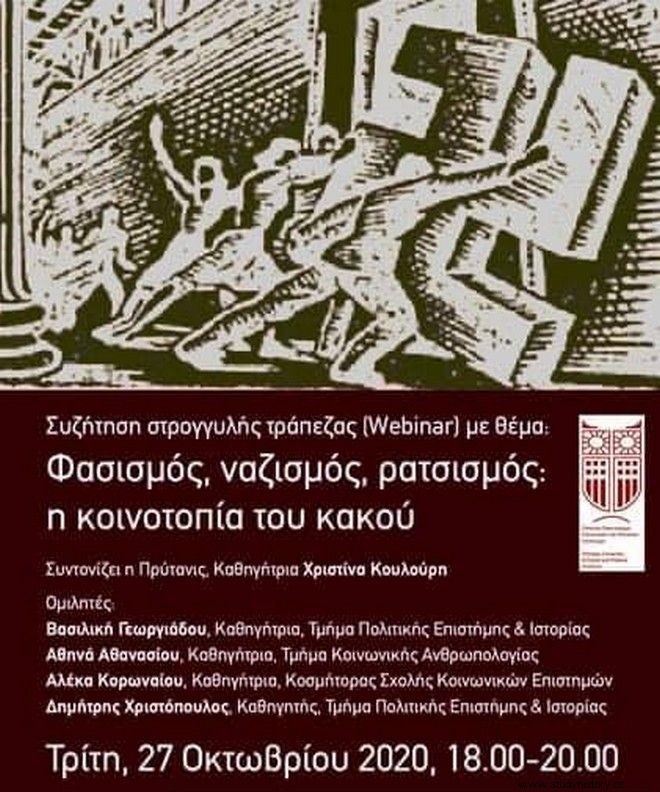This year's special circumstances due to the pandemic enabled Panteio University to celebrate the national anniversary of October 28 outside of the usual. So on Tuesday, in a round table discussion, four professors of the University (Vasiliki Georgiadou, Athena Athanasiou, Aleka Koronaiu and Dimitris Christopoulos) will talk on the topic "Fascism, Nazism, Racism:The Banality of Evil" .
As can be seen, this discussion is taking on a different dynamic due to the recent developments in the Golden Dawn trial.
The News24/7 spoke with the Rector of Panteion University, Christina Koulouri, who will moderate the discussion.
How did the idea for the event come about and what do you think it will offer different from the established ones?
Every year the University celebrated the anniversary on October 28 in the same standard way, a celebration very much like those in schools, with songs, poems and the recitation of some eulogy. Few attended these events that had no real impact even within the academic community. So this year when it was not possible to organize a celebration in person, we thought it would be a good opportunity, as a university of social and political sciences, to organize an alternative celebration with a discussion that would be attended by a wide audience and touched issues that interest our society. This discussion is the trigger for reflection on the universal meaning of October 28 and a challenge to see the national anniversary as an opportunity for self-awareness.
What is this invisible "link" that connects the "evil" as expressed during the occupation period with the "evil" as expressed in Greece during at least the last 10 years of the crisis?
The bond is not exactly invisible even though we tend to overlook it. The basic elements of the fascist ideology that reached its height during the Second World War continued to exist with the tolerance of the political elites in the Cold War environment, even if disguised. The fierce anti-communism that marked the post-war era allowed the descendants of fascists and Nazis to hide behind the mask of patriotism. "Evil" therefore existed but was not expressed through specific political parties. The economic crisis gave the opportunity for "evil" to be brought out of obscurity and expressed publicly, to be politically legitimized. As in the interwar period, the political expression of fascism projected an "anti-systemic" and radical face.

In your opinion, what are those elements that testify to a fascism in Greek society today that exists despite the victory of the anti-fascist movement in the case of Golden Dawn?
It is too much to talk about the fascism of Greek society. The trial and conviction of Golden Dawn showed that our democracy endures. However, there are attitudes and opinions that are expressed in society, which refer to the "community of evil" and concern racist attitudes towards immigrants, homophobia, anerophobia, etc. The most dangerous thing is that these opinions are spread through the media in high-profile broadcasts. television viewing while social media also offer fertile ground for the speech of hate.
Why do you think the fascist phenomenon has survived for almost 100 years despite the fact that fascism has demonstrated its brutality in every way?
The longevity of the phenomenon is indeed remarkable and many have attempted to interpret it. The answer is not easy. It is like asking why people continue to wage war despite knowing its grim consequences. There are elements in fascist ideology that appeal to the emotional and create fixation and fanaticism as in religion. Let's also not forget fascism's idealization of violence, so the brutality of the acts is not a disincentive.

In an era where economics dominates the public debate, even in a pandemic period like the one we are going through, what is your vision for the humanities and what answers can they give to contemporary problems?
In today's globalized environment, the linking of studies to the labor market and the emphasis on the 'usefulness' of science in economic terms have undermined the position of humanities studies, resulting in them being relegated to the preferences of young people and underfunded. However, the social sciences and humanities play a crucial role in the construction of modern societies, especially in an era of rapid changes where we need tools of understanding and analysis in the exercise of public policies. The social sciences and humanities offer the moral armor, critical intellectual attitude, and creativity without which societies can slip much more easily into the pitfalls of various fascisms. Our country has a great capital in the field of humanitarian studies, which should not be wasted. Panteion University, as the only university of social and political sciences, should lead the effort to upgrade these scientific fields, where Greece is truly competitive.
Read the News from Greece and the world, with the reliability and validity of News247.gr.
